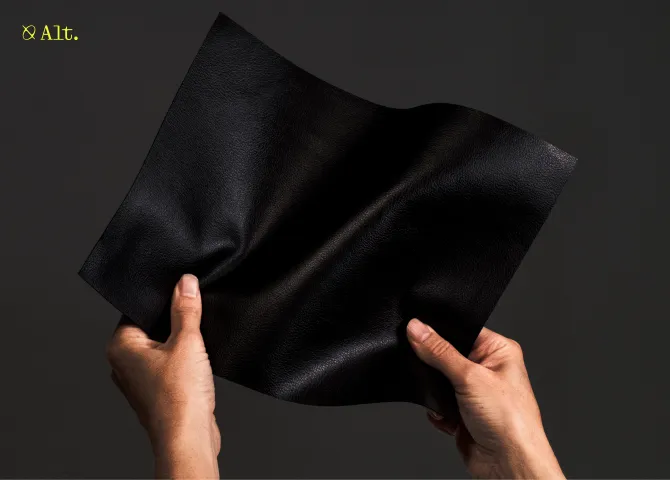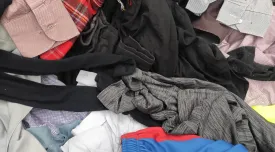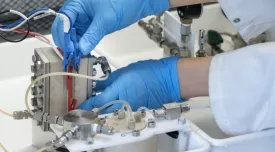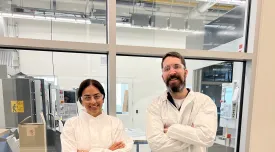Breadcrumb
- Home
- Melbourne Stories
- Plant based, luxury leather Alt.
Plant based, luxury leather Alt.
Alt. Leather produces 100% plant-based leather alternatives. Turning agricultural biomass, natural fibres and regenerative plant-based ingredients into a world-class material for application across fashion, footwear, furniture and automotive interiors.

Alt. Leather's novel, patentable technology combines natural fibres in a plant-based resin matrix to mimic the 3D network structure of animal leathers in order to create durable and flexible leather alternatives. By formulating plant-based biopolymers we produce a material with the look, feel and performance of leather without the greenhouse gas emissions of livestock production or petrochemical processing.
Founder Tina Funder is an award-winning creative director with 18 years of global advertising experience, working on strategic multinational campaigns for some of the largest corporations across Europe, the Middle East and Australia. A natural problem solver, Tina’s expertise lies in building successful teams to bring exceptional projects to life, including the launch of her own premium leather-alternative handbag label LOM Australia.
During the 18 months it took to research, design and create LOM Australia, Tina identified gaps in the market in terms of plastic-free leather alternatives, which triggered the quest to develop an Australian-made material that ticks all boxes for product designers worldwide. With Australia’s rich agricultural landscape and access to world-class scientific research institutes, Tina engaged a team of material scientists and biopolymer experts, and Alt. Leather was born.
The team at Alt. Leather believes that the future of leather is plant-based, low impact, cruelty-free and petrochemical plastic-free.
Why Melbourne?
We love Melbourne! For us Melbourne is a great place to start a business, not only due to its thriving start-up network, but we also have access to numerous world-class research institutes and an emerging biotech industry.
"Our material is responsibly and ethically made in Melbourne without risk to our team’s health and safety, or the environment."
Challenge
The fashion and textiles industry generates 10% of worldwide carbon emissions with leather being one of the most destructive textiles on the planet. Whether it is made from animals or petroleum-based plastics, both come with their lists of negative environmental impacts like fossil-fuel extraction, greenhouse gas emissions, deforestation, water wastage, toxic chemical use, eutrophication and unethical treatment of animals and workers. Our material will provide a greener, circular solution to animal and plastic synthetic leathers.
Leather is one of the most destructive textiles on the planet. Traditional leather is a US400billion dollar commodity making it a profitable co-product of the beef industry responsible for large-scale deforestation including 80% of the Amazon’s deforestation in Brazil. Leather production and tanning ranks amongst the highest sectors for toxic water waste generation globally with its use of chemicals such as chromium VI, aldehydes and heavy metals – untreated effluent from tanneries in developing countries causes significant environmental damage to surrounding waterways. Tanneries also produce huge amounts of solid waste. For context, one ton of wet hide yields only 200 kg of leather and about 85% leather as end-product, but over 200 kg of tanned waste. These wastes are mainly deposited in landfills, and challenge the solid waste management system due to the non-biodegradability of tanned leather.
Australia is one of the top ten major cattle skin producing countries. In this country alone, cattle ranching causes a colossal 93% of deforestation in the world renowned Queensland’s Great Barrier Reef catchments, with cattle grazing the leading cause of habitat destruction across the country. This is devastating to biodiversity and the native animals endangered by this desecration.
The synthetic leather wholesale market is estimated at close to US70 billion, of which over 98% is comprised of Polyurethane (PU) or Polyvinyl chloride (PVC) based plastic synthetics derived from fossil fuels. PVC is one of the most widely used polymers globally and is extremely toxic both environmentally and to human health officially classified as a human carcinogen in 1974. In December 2023, the US Environmental Protection Agency announced a 12-month review that could lead to a ban of PVC in the US.
Solution
Alt. Leather is a low-impact 100% plant-based leather alternative. Cradle to gate (considering the whole cow) our projected impact is 10-30 times less carbon intensive and 100,000 times less water intensive than a traditional animal leather and our material is completely petrochemical-free. The ingredient inputs we use are derived from a combination of waste streams and regenerative plants that are available in abundance globally. Our material is responsibly and ethically made in Melbourne without risk to our team’s health and safety, or the environment.
We are working with the University of Newcastle to ensure that our product does not affect soil microbiome as it breaks down, recent ecotoxicity results are 100% positive when tested on worm health. Whilst the ultimate aim of our material is longevity, to ensure that our product is circular, we are undergoing rigorous testing for end-of-life solutions including recyclability and industrial composability with data expected end of 2024.
Up to two thirds of a brand’s environmental impact can be derived from choice of raw materials. We help sustainably focused brands across fashion, footwear, furniture and automotive meet their ESG targets with our low-impact leather alternative. With the EU and US committing to tighter regulations around greenwashing, eco-design for sustainable/circular products and corporate sustainability due diligence, there is increasing pressure on companies across all verticals to reduce their impact, so they are actively searching for alternatives like Alt. Leather.
Watch Tina pitch Alt. Leather at Startmate Demo Day!
Results
Our team is pushing the boundaries of biomaterial innovation, at pace. Within ~20 months, we have achieved significant traction:
- Grown our team from 1 to 5 (+3 additional Monash University student projects)
- Developed our base material and patentable IP
- Conducted 60+ qualitative interviews with iconic brands globally (including tier 1 automotive brands and suppliers and local and international fashion brands)
- Appeared in Melbourne Fashion Week
- Raised AUD1.1Million to commercialise our world-class material
- Moved into Monash Innovation Labs with access to advanced equipment
- Selected for the India Australia RISE Accelerator program (RISE Accelerator) delivered by CSIRO, Australia’s national science agency, in partnership with Atal Innovation Mission, 2024
- Accepted into Climate Salad Global Growth Program, 2024
- Offer to display at Future Fabrics Expo Innovator Hub, London 2024
- Commenced product development with local artisans and designers, including footwear and apparel
- Commenced ISO standard testing, Lifecycle Assessment and End-of-Life testing.
- What are the runs on the board and achievements you’ve made?
As above.
- What plans do you have to scale?
Our ambition is to have our pilot plant operational in Melbourne by end of 2025 with scale up scheduled for 2027.
We are actively talking to and seeking strategic brand partners and investors to help us scale. If you are a sustainably focused brand or investor who is interested in making a positive impact with Alt. Leather, please don’t hesitate to get in touch.
Contact
www.linkedin.com/company/altleather
www.instagram.com/alt.leather_
Sources
Our projected impact: carbon cost of leather goods, CFJ
Market Sizing: Leather – harmless byproduct or crucial profit component? MII
How leather supply chains around the globe are tied to deforestation, CFJ
2021 State of Industry Report: Next gen Materials
Leaching toxicity and ecotoxicity of tanned leather waste, Science Direct
Artisanal tannery wastewater: quantity and characteristics, NIH
US begins review that could lead to PVC ban, Phys Org
Two-thirds of a brand’s climate impact, BCG
Ecodesign for Sustainable Products Regulation





